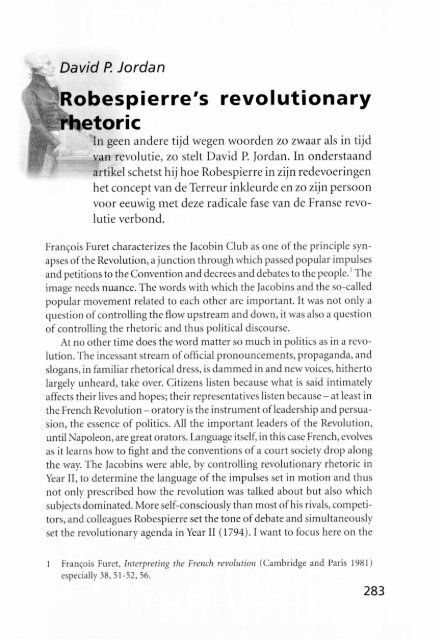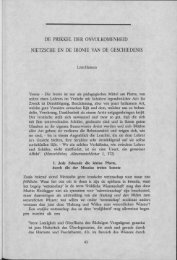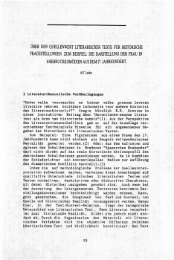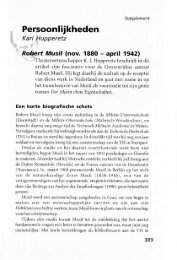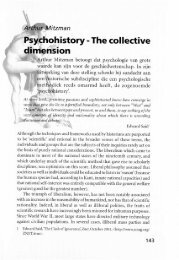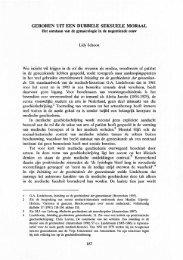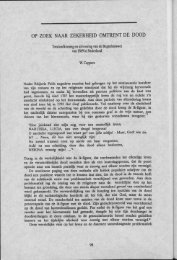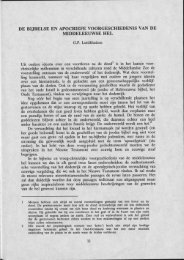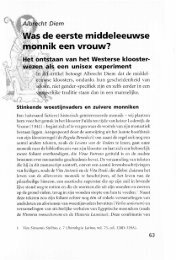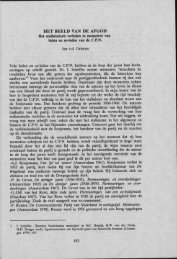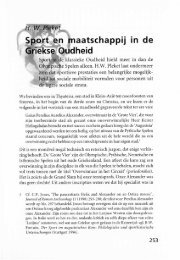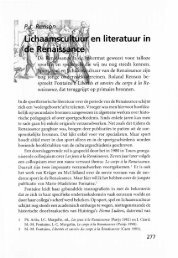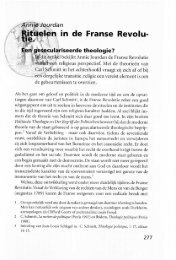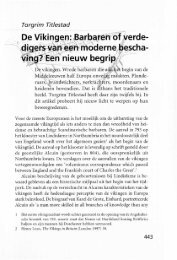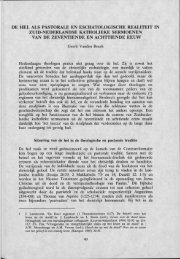Robespierre's revolutionary etoric - Groniek
Robespierre's revolutionary etoric - Groniek
Robespierre's revolutionary etoric - Groniek
You also want an ePaper? Increase the reach of your titles
YUMPU automatically turns print PDFs into web optimized ePapers that Google loves.
David P. Jordan<br />
<strong>Robespierre's</strong> <strong>revolutionary</strong><br />
<strong>etoric</strong><br />
In geen andere tijd wegen woorden zo zwaar als in tijd<br />
van revolutie, zo stelt David P. ]ordan. In onderstaand<br />
artikel schetst hij hoe Robespierre in zijn redevoeringen<br />
het concept van de Terreur inkleurde en zo zijn persoon<br />
voor eeuwig met deze radicale fase van de Franse revolutie<br />
verbond.<br />
François Furet characterizes the Jacobin Club as one of the principle synapses<br />
ofthe Revolution, ajunetion through which passed popLJlar impulses<br />
and petitions to the Convention and decrees and debates to the people. ' The<br />
image needs nuance. The words with which the Jacobins and the so-called<br />
popular movement related to each other are important. It was not only a<br />
guestion ofcontrolling the flow upstream and down, it was also a guestion<br />
of controlling the rh<strong>etoric</strong> and thus political discourse.<br />
At no other time does the word matter so much in polities as in a revolution.<br />
The incessant stream of offi.cial pronouncements, propaganda, and<br />
slogans, in familiar rh<strong>etoric</strong>al dress, is dammed in and new voices, hitherto<br />
largely unheard, take over. Citizens listen because what is said intimately<br />
affects their lives and hopes; their representatives listen because - at least in<br />
the French Revolution - oratory is the instrument ofleadership and persuasion,<br />
the essence of polities. All the important leaders of the Revolution,<br />
until apoleon, are great orators. Language itself, in this case French, evolves<br />
as it learns how to fight and the conventions of a court society drop along<br />
the way. The Jacobins were able, by controlling <strong>revolutionary</strong> rh<strong>etoric</strong> in<br />
Year lI, to determine the language of the impulses set in motion and thus<br />
not only prescribed how the revolution was talked about but also which<br />
subjects dominated. More self-consciously than most ofhis rivals, competitors,<br />
and colleagues Robespierre set the tone of debate and simultaneously<br />
set the <strong>revolutionary</strong> agenda in Year II (1794). 1 want to focus here on the<br />
François Furet, Tnterpreting the French revo/ution (Cambridge and Paris 1981)<br />
especiaUy 38, 51-52, 56.<br />
283
284<br />
Jordan<br />
Convention session of 17 Pluvióse (5 February 1794) when Robespierre set<br />
forth the domestic policy of the Committee of Public Safety. Policy is too<br />
concrete a word; it presupposes specific actions and deeds which articulate<br />
general principles. <strong>Robespierre's</strong> discourse was far more abstract, the actions<br />
and deeds he announced were more often than not as general as were his<br />
principles. He had the most synoptic mind of the major Jacobin leaders,<br />
despite his solid quotidian grasp of polities. It was up to his listeners and<br />
adherents to make actual what he had articulated.<br />
The Terror is the most problematic and moraUy fraught episode in the<br />
Revolution. So long as it was considered a necessary emergency measure<br />
forced upon France by circumstances external to the Revolution, terror was<br />
considered by most a justifiabie response to Revol utionary crisis. The word<br />
terreur then meant forcing the nation to obey the new <strong>revolutionary</strong> government<br />
in its struggle to stay alive while punish ing those who committed<br />
crimes against the Revolution. Terreur kept its literal meaning until the last<br />
months of 1793; extreme fear, with the added edge contributed bythe Revolution<br />
of collective fear experienced by a group (or a population), inflicted<br />
upon them as a means of governing. This kind of terror is best studied at<br />
ground level, and has been weU served by several monographs. 2<br />
As the ongoing crisis intensified, in the summer of 1793, the meaning<br />
of the word changed with circumstances. That summer, General Oumouriez<br />
fled and turned his coat, the Convention was purged by the Jacobins,<br />
Saint-Just and Robespierre were elected to the Committee of Public Safety,<br />
26 of the 83 departments were no longer under the control of Paris (most<br />
notably those in the Vendée and the Midi where civil war raged) and the<br />
new constitution was shelved until the end of the war.<br />
The habitual view ofthe Terror, both at the time and in a vast historiography,<br />
is that it was forced upon the Revolution by its enemies, particularly<br />
by the Hébertist uprising ofSeptember 5,1793, which put the two popuI ar<br />
fire-eaters, Collot d'Hérbois and Billaud-Varen nes, on the Committee of<br />
Public Safety and pushed the Convention Assembly toward the frightful<br />
2 Colin Lucas, The Strueture of the Terror: The Example of javogues and the Loire<br />
(Oxford 1973), and William Scott, Terror and Repression in Revolutionary Marseilles<br />
(London t973), are older but still very good local studies ofhow the Terror worked<br />
at ground level in the provinces. More recently see David Andress, The Terror: The<br />
Merciless War for Freedom in Revolutionary France (New York, 2006), and jean-Pierre<br />
Gross, Fair Shares for All: }acobin Egalitarianism in Praetice (Cambridge, England,<br />
1996).
<strong>Robespierre's</strong> <strong>revolutionary</strong> rh<strong>etoric</strong><br />
Law ofSuspects (September 17, 1793), the centrallegislation ofterror.lfthe<br />
Revolution was to survive, the rationale runs (and ran), the most vigorous<br />
measures had to be used. The more sensible Jacobins - René Levasseur (de<br />
la Sarthe) is a good example 3 - defended the Terror in practical terms as a<br />
temporary response to extraordinary circumstances, and he is representative<br />
of the range of Jacobinism, from the foot soldiers to the ideologues.<br />
Levasseur was a regicide, a robespierriste, albeit one with reservations about<br />
the lncorruptible, and he survived <strong>Robespierre's</strong> fall. He had been sent en<br />
mission by the Jacobins which testifies to the purity ofhis radical credentials,<br />
and he proved himselfa war hero at the battle ofHondschoote (September<br />
8,1793). He was also instrumental in the destruction ofPierre Philippeaux,<br />
his colieague from Le Mans who went to his death as a Dantonist; but he<br />
seems to have been uninterested in philosophical refinements and justifications<br />
for terror. He never spoke before the Convention (nor at the Jacobins it<br />
appears), and even from exile - he was among the scores ofliving regicides<br />
who were driven from France by the Restoration. He defended his actions,<br />
accepted the denouncement of'terrorist' as a badge of <strong>revolutionary</strong> conviction<br />
and the necessity of violence, but never mentioned <strong>Robespierre's</strong><br />
vision of tenor as a weapon in the crusade for virtue. Kept in this register<br />
of self defense, a legitimate and even historically natural response to fear<br />
and threat, the terror then did not need - and contiJ1UeS for many writers<br />
not to need - any moral justification. lts practitioners are absolved in the<br />
name ofnecessity, as Levasseur let himselfoffthe hook. This has been, until<br />
recently, the historical orthodoxy, an apologia for the Terror.lt has the defect<br />
of lumping two different terrors into a single phenomenon.<br />
Terreur, when considered as a deliberate policy not just to defend and<br />
save the Revolution by eliminating its enemies but as a weapon for transforming<br />
the Revolution and those it should benefit, is best understood as<br />
an ideological phenomenon. This approach describes the limited scope of<br />
this essay. As an ideology, terror is not tied to circumstances, but has its<br />
own driving force. The use of terror in this sense had been presented at the<br />
Paris Jacobin Cl ub before the insurrection ofSeptember 5, 1793 which, in<br />
the conventional view'forced' tenor (and the Maximum) upon a reluctant<br />
Convention. Lucien Jaume argues that ideological tenor can be traeed back<br />
at least to August 10. The arrival of the fédérés who came for the fête de la<br />
3 The Mémoires de R. Levasseur (de la Sarthe), ex-conventionnel have been republished<br />
(Paris 1989).<br />
285
286<br />
Jordan<br />
fédération in July and would stay to storm the Tuileries and dethrane the<br />
king, provided the catalyst. 4 The so-called Hébertist insurrection in September<br />
only gave the Jacobin ideological initiative the popular support it<br />
needed. François Furet, in a famous argument, insists terror is inherent in<br />
the ideology ofthe Revol ution itself, and the exclusions fram the body poli tic<br />
of the privileged orders, first demanded by Sieyès in his 1788 pamphlet,<br />
Qu'est-ce que Ie Tiers-Etat?, are a first step toward terror.<br />
There is one further ingredient in ideological terror befare it is given<br />
its definitive philosophical farm by Robespierre. Saint-Just, in his Rapport<br />
sur la nécessité de déciarer Ie gouvernement révolutionnaire jusqu'à la paix,<br />
had chillingly argued, 'You have to punish not only the traitors, but even<br />
those who are indifferent; you have to punish whoever is passive in the republic,<br />
and who does nothing for it.'5 This extended the terrar from deeds<br />
to motivation, fram the external to the psychological, and thus expanded<br />
terror infinitely, bath in duration and potential victims. 6 The majority of<br />
those sent to the guillotine in Year IJ, according to the figures assembIed<br />
by Donald Greer/ mounted the scaffold for '<strong>revolutionary</strong> opinions' or<br />
'conspiracy', neither of which crimes involves action. In Saint-Just's view<br />
their crimes were committed befare they were expressed or committed, as<br />
'<strong>revolutionary</strong> opinions' or 'conspiracy'.<br />
Although Saint-Just here remains in the register ofdefense and punishment<br />
and makes na arguments for Terror as the taal for creating virtue,<br />
he has intraduced not only a shift in emphasis but in purpose. Detaching<br />
terror from circumstances (wh ether self-defense or <strong>revolutionary</strong> compuIsion),<br />
which Saint-Just has already begun and which Robespierre would<br />
complete, moved the terrar inward, sa to speak, and in doing sa c10sed<br />
debate on a subject that even before<strong>Robespierre's</strong> Pluvióse speech had<br />
4 See L. Jaume,Le discourse jacobin et la démocratie (Paris 1989) 117, where he specifically<br />
credits Royer, the 'porte-parole' of the fédérés at the Jacobins.<br />
5 Saint-Just, CEuvres choisies (Collection idées: Paris 1968) 169. 'Vous avez à puni r non<br />
seulement les traîtres,mais les indifférents mêmes; vous avez à pLlIlis quiconque est<br />
passif dans la République et ne fait rien pour elle; cal', depuis que Ie people français<br />
a manifesté sa volonté, tout ce qui lui est opposé est hors Ie souverain; tout ce qui<br />
est hors Ie souverain est ennemi.'<br />
6 In the same speech Saint-Just insists: '( ...) tous les ennemis de la République sont<br />
dans son gouvernement' and: 'Vous n'avez plus ri en à ménager contre les ennemis<br />
du nouvel ordre de choses, et la liberté doit vaincre à tel pri.x que ce soit.'<br />
7 D. Greer, The fncidence ofthe terror during the French Revolutio11. A statistical interpretation<br />
(Cambridge 1935; reprinted, Gloucester 1966).
Portrait of Robespierre by Pierre Roch Vigneron (1791) in:<br />
David Andress, The terror. The merciless war Jor freedolll in<br />
<strong>revolutionary</strong> France (New York 2005).<br />
Robespierre '5 <strong>revolutionary</strong> rh<strong>etoric</strong><br />
been relatively insignificant. It<br />
would be virtually impossible,<br />
leaving aside political considerations,<br />
to debate the meaning<br />
of a crime that was committed<br />
in the minds of men.<br />
Of all the great events and<br />
movements in the Revolution<br />
the Terror is the least debated.<br />
There are, to be sure, ca Us for<br />
vengeance - the coun terrevolution<br />
at Lyons calied forth such<br />
rh<strong>etoric</strong> at this very moment<br />
- punishment, and intimidation,<br />
but these are not publicly<br />
argued so much as echoed and<br />
reiterated. And such demands<br />
are uniformly concerned with<br />
specific deeds that need punishment.<br />
Even the terrible Law<br />
of Suspects, the centrallegislation<br />
of the Terror (September<br />
17), was not debated. Perhaps terror is inherently beyond debate precisely<br />
because it is an instrument to silence debate, and is motivated by fear.<br />
Moving the debate away from circumstances effectively cut the ground<br />
from under those who saw it tied to the war, self-defense, and <strong>revolutionary</strong><br />
discipline. Danton is the most famous victim of this Jacobin alchemy. He<br />
and the so-cal1ed 'indulgents' go to their deaths because they insisted the<br />
emergency measures, especially the Terror, could be graduaUy abandoned<br />
as the war situation improved. Danton's tragedy was to be three months<br />
premature in his call for the end of the Terror. The Jacobin shift ofemphasis<br />
and purpose also, ironically, took away from the terrorists the rationalization<br />
of necessary violence. Official violence was about to become not<br />
only bureaucratized but moral1y beneficia!, and those who, like Levasseur,<br />
resorted to violence out of the conviction of necessity and self-defense,<br />
would be deprived of their rationalization.<br />
On December 5,1793 (15 Frimaire) Robespierre intervened in response<br />
to a manifesto from Piu (November 19) disclaiming any territoria] ambi-<br />
287
288<br />
Jordan<br />
tions, insisting on England's sole motive as defensive, and reaffirming her<br />
determination to struggle against a doctrine 'that leads to the destruction<br />
of societies and the ruin of individuals.'8 <strong>Robespierre's</strong> defiant response<br />
is perhaps his earliest use of the word terreur in the special Jacobin sense<br />
under consideration here:<br />
'The kings in coaJition against the Republic make war on us with their<br />
armies, with intrigues and with slander. We will oppose to their armies our<br />
braver armies; to their intrigues the vigilance and terror of national justice;<br />
to their slanders, the truth.'9<br />
Terror is the just response to intrigues in foreign affairs, those ofthe monarchical<br />
enemies; it is but a short step to domesticating the idea and turning<br />
it against French citizens. The full-blown theory of <strong>revolutionary</strong> terror<br />
does not yet exist, but the pieces are coming together.<br />
We tend to forget, reading Robespierre, that behind his abstractions, his<br />
elevated rh<strong>etoric</strong>, his dense juxtapositions, lie the events of the Revolution<br />
to which he is responding. Between the declaration of Terror as the order<br />
of the day (October 10, 1793) and <strong>Robespierre's</strong> philosophy of terror in<br />
February lies a confused tangle of history which can only be selectively<br />
sketched here. The law of Revolutionary government had been passed on<br />
December 4,1793, just as the massacres at Lyon were being perpetrated. By<br />
the middle of the month the British, bombarded by the young Napoleon<br />
Bonaparte who thus exploded into history, had evacuated Toulon. The<br />
foreign crisis seemed momentarily resolved. Attention turned to domestic<br />
matters. In early January Fabre d'Eglantine, Danton's friend and the poet<br />
ofthe <strong>revolutionary</strong> calendar, and most recently the creator and denouncer<br />
of the 'Foreign Plot', had himself been arrested, one of the first important<br />
Jacobins to fall. The following month, on February 5, 1794, Robespierre<br />
presented 'The Moral Principles that Ought to Guide the Domestic policies<br />
of the National Convention.'lo The title itself is instructive and indicative<br />
of Jacobin polities.<br />
8 '[Q]ui tend à la destruction des sociétés et à la mine des individus.'<br />
9 CEuvres de Maximilien Robespierre, tome X, Discours (5') partie, 227. Les rois coalisés<br />
contre la République nous font la guerre avec des armées, avec des intrigues<br />
& avec des libelles. Nous opposerons à leurs armées des armées plus braves; à leurs<br />
intrigues, la vigilance & la terreur de la justice nationale; à leurs libelles, la vérité.<br />
10 'Sur les principes de morale politique qui doivent guider la Convention nationale<br />
dans I'administration intérieure de la République.'
Robespierre '5 <strong>revolutionary</strong> rh<strong>etoric</strong><br />
If one had to choose a representative Robespiene speech, or more<br />
generally a representative Jacobin speech, this is arguably the one. All the<br />
fundamentaJ concerns of Jacobinism are present. Democracy is, for them,<br />
to be founded on a necessary and peremptory exclusion. Only those who<br />
are worthy are to be included in the new republic. The purifications at the<br />
Jacobin Club determined worthiness by judging the <strong>revolutionary</strong> biographies<br />
ofall their members. Saint-Just's expression ofthe idea is more brutal<br />
and succinct that Sieyès's loathing ofthe privileged orders and his argument<br />
that the Third Estate contains all that is necessary for the nation: 'what makes<br />
a Republic', Saint-Just says: 'is the total destruction of all that is opposed<br />
to it.'11 This is one of the paradoxes of Jacobinism. Because there is only a<br />
single truth, unanimous adherence is the only acceptable possibility. Those<br />
who are the minority do not get their rights protected, they get expelled, or<br />
worse. To create democracy one must behave undemocratically.<br />
The experience of revolution led the Jacobins increasingly to blur the<br />
distinctions between an emergency government and a constitutional one,<br />
or at least a regular government and a necessary government. Tenor until<br />
peace, proposed by Saint-Just in October, 1793, would become in <strong>Robespierre's</strong><br />
formu]ation, tenor until virtue is achieved. Jacobin rule, and the<br />
Tenor, looked increasingly permanent. Robespiene argues that the Tenor<br />
is 'Iess a particular principal as a consequence of the general principle of<br />
democracy applied to the most critica] needs of the country.'12 Tenor is here<br />
no longer a means of compelling the country to submit to <strong>revolutionary</strong><br />
discipline or rectitude: it is now an emanation of democracy.<br />
Much the same is true of the Jacobin insistence on the need to regenerate<br />
the people. There had been earl ier formulae: education, new laws and<br />
institutions, even the later Festival of the Supreme Being, which Brissot had<br />
made in 1792, was the weapon of regeneration. At the time Robespierre<br />
thought these were extravagant claims for the energizing and restorative<br />
values of war, which would invigorate the nation and call forth patriots,<br />
while simultaneously exposing the duplicity of the king. He argued strenuously<br />
against the Brissotins, to na avai!. The Jacobin Bil1aud-Varenne went<br />
much farther the following year. It was not the war that would regenerate<br />
France, but a reworking of human behavior:<br />
'We must, sa to speak, recreate the people we want to make free, for we must<br />
destroy ancient prejudices, change aid habits, purify depraved affectatians,<br />
II Quoted in )aume, 12.<br />
J2 Quoted in )aume, 13.<br />
289
Jordan<br />
Thc former jaeobin ehureh on Rue Sainl- Honoré where the Jaeobin club meI and disClissed thc progress<br />
of the Freneh Revolution in: G. Rudé, Robespierre. Portmit of(I Revo/litioll(lry Dell/eemt (London 1975)<br />
40.<br />
check superfluous needs, extirpate inveterate vices. Thus we need strong<br />
action, vehement impulsion, sufficient to deveJop the civic virtues, and to<br />
suppress the passions of indecent desires, of intrigue, and of ambition.'13<br />
There is no way ofknowing what was in <strong>Robespierre's</strong> mind when he wrote<br />
the speech of 17 Pluvióse. He was not a forthcoming man. Although he<br />
spoke often about himself he did so not with the self-righteolls candor of<br />
Rousseau, but in abstractions: he was the voice of the people, the voice of<br />
the Revoilltion. We have only his words, cut adrift from their motives, and<br />
we are left to ponder their origins. He may not have been transparent, but he<br />
was a careful and lucid writer whose words are instructive and revealing.<br />
ot only is Robespierre able to control whatever discussion of the Terror<br />
there was by fixjng the parameters of debate in the Pluvióse speech,<br />
but in eJevating the discussion to an abstract plane he effectively silenced<br />
any discussion of the Terror as a temporary and necessary response to<br />
circumstances. It was no langer a strategy or an expedient of government,<br />
a necessary world in which the survival of the Revolution absolved men<br />
of many acts. Terror was, rather, a principle of democracy, inherent in its<br />
13 Quoted in )aume, lil<br />
290
Robespierre '5 <strong>revolutionary</strong> rh<strong>etoric</strong><br />
struggle for realization. He additionally distanced himself from the actual<br />
acts of terror in this speech by his rh<strong>etoric</strong>al choices. It is doubtful that<br />
he had any feeling for those who were terrorized for he seems not to have<br />
thought much about them. They too were abstractions, enemies, traitors,<br />
and aristocrats who had to be unmasked; but they were not individuals.<br />
His moral stance was clear and exonerated him and hi ideals. He treated<br />
terror as a series of necessary actions whose goal was the achievement of a<br />
virtuous ociety. This utopian, even millenarian thinking was not new to<br />
the Revolution, but its attachment to terror wa . Terror, now the law of the<br />
land, would be exercised against all those who blocked, opposed, corrupted,<br />
criticized, or disapproved of virtue. There was, for Robespierre, no need<br />
to apologize or excuse terror since it brought the nation closer to the goals<br />
of the Revolution. He had no sense of any personal psychological needs or<br />
drives, no sense ofany desire for satisfaction or gain, even na sense ofa love<br />
of power. He was only the instrument of the Revolution, the man through<br />
whom the Revolution spoke. 14 A special kind of vanity.<br />
He begins by insisting that heretofore tbe Revolution had been instinctive,<br />
reacting to circumstances as they arose. Tbe sole guide to bebavior<br />
was 'love of the good and a feeling for the needs of la Patrie.' There was no<br />
'exact theory of the precise rules of conduct, for we hadn't the leisure to<br />
make one,.15 Now the time has come. First he presents a parallel series of<br />
antithesis, a familiar robespierriste rh<strong>etoric</strong>al device:<br />
'We want to substitute in our country morality for egoism, probity for honor,<br />
principles for habits, duties for etiquette, the dominion af reasan far the<br />
tyranny of fashian, the scorn of vice far the scarn of misfartune, courage<br />
for insalence, the greatness of the soul far vanity, the lave of glary far the<br />
lave af money, goad men for gaad company, merit far intrigue, genius<br />
for c1everness, truth far brilliance, the charm af happiness far the ennuie<br />
of voluptuausness, the grandeur af man for the pettiness of the great, a<br />
magnanimaus, strang, bappy peop!e, an amiable people, far frivality and<br />
14 I make this argument at length in my The Revolutionary Career of Maxirnilien<br />
Robespierre (New York 1985) passim.<br />
15 Robespierre, CEuvres, X, 351. 'Mais, jusqu'au moment même ou je parIe, il faut<br />
convenir que nous avons été plutöt guidés, dans des circonstances si orageuses, par<br />
l'amour du bien et par Ie sentiment des besoins de la Patrie, que par une théorie<br />
exacte et des règles précises de conduite, que nous n'avions par même Ie loisir de<br />
tracer.'<br />
291
292<br />
Jordan<br />
misery. In a word, all the virtues and aU the miracles of the republic for all<br />
the vices and all the absurdities ofthe monarchy."6<br />
This ean be read literally as a kind of <strong>revolutionary</strong> romanticism - some<br />
prefer fustian - but I think his intention is not to make a rh<strong>etoric</strong>al catalogue<br />
ofopposites. He is thinking ofdemocracy, or a republic, in the terms<br />
that Montesquieu made famous in I'Esprit des Lois. Early on in his great<br />
treatise Montesquieu sets out the 'principles' of the three kinds of govern<br />
ment - republie (whieh has both an aristocratie and a democratie form),<br />
monarchy, and despotism. 17<br />
'A great deal of probity is not necessary for a monarchical or a despotic<br />
government to maintain or sustain itself. The force of laws in a monarchy,<br />
and the constant threat of the prince's might in a despotism are sufficient<br />
to regulate or control all. But in a popular state one additional quality is<br />
needed, which is VIRTUE.'18<br />
When Virtue is lost, he continues in a qualification Robespierre wil! twist,<br />
'ambition fil!s men's hearts ready to receive it, and avariee affects a1J.'19<br />
'Despotism is at the other end of the spectrum. lts principle is fear: Just<br />
as virtue is fundamental to arepublic and honor to a monarchy, FEAR is<br />
fundamental to a despotic government. Virtue is completely unnecessary<br />
and honor would be dangerous.'zo<br />
And Fear is no temporary expedient, no simple response to circum<br />
stances:<br />
16 Robespierre, CEeuvres, X, 352. 'Nous voulons substituer, dans notre pays, la morale<br />
à l'égoisme, la probité à l'honneur, les principes aux usages, les devoirs aux bienséances,<br />
l'empire de la raison à la tyrannie de la mode, Ie mpris du vice au mépris<br />
du malheur, la fierté à ['insolence, la grandeur d'àme à la vanité, l'amour de la gloire<br />
à I'amour de l'argent, les bonnes gens à la bonne compagnie, Ie mérite à l'intrigue,<br />
Ie génie au bel esprit, la vérité à l'éclat, Ie charme du bonheur aux ennuis de la<br />
volupté, la grandeur de l'homme à la petitesse des grands, un peuple magnanime,<br />
puissant, heureux, à un peuple aimable, frivole et misérable, c'est-à-dire, toutes les<br />
vertus et tous les miracles de la République, à tous les vices et à tous les ridicules de<br />
la monarchie.'<br />
17 Montesquieu, CEuvres complètes, 2 vals. (Paris, 1951-58),11, Livre lIl, Chapitre 1.<br />
All references will be to this edition.<br />
18 Montesquieu, IJl, 3, 25 I.<br />
19 Ibidem, lIl, 3, 252.<br />
20 Ibidem, lIl, 9, 258.
<strong>Robespierre's</strong> <strong>revolutionary</strong> rh<strong>etoric</strong><br />
'A moderate government may, whenever it wishes and without ri k, relax<br />
its principles. It supports itself by its laws and its inner strength. But when,<br />
in a despotic government, the prince ceases for a single moment to keep<br />
his sword suspended over his subjects, when he cannot in tantly destroy<br />
annihilate those who hold the most important positions, all is lost. The<br />
essence of this government is fear and when it no longer is felt, the people<br />
have lost their protector.'21<br />
These arguments and distinctions were as familiar to <strong>Robespierre's</strong> contemporaries<br />
as they were to him. The philosophes, along with some of the<br />
books and thought of Greco-Roman antiquity, provided a freemasonry of<br />
reference and argument for the revolutionaries. <strong>Robespierre's</strong> variations on<br />
these themes originally composed by Montesquieu, were both understood<br />
and original. 'In order to found and consolidate democracy, in order to reach<br />
the peaceful regime of constitutionallaws', he argues, 'we have to end the<br />
war ofliberty against tyranny and successfully get through the storms ofthe<br />
Revolution.' To do so he continues, echoing Montesquieu, 'the spirit of the<br />
<strong>revolutionary</strong> government' must be 'combined with the genera! principles<br />
of democracy'.22 Presumably the 'spirit of the <strong>revolutionary</strong> government'<br />
is the work of the Committee of Public Safety and the Terror, which seems<br />
here to be offered as a temporary expedient, an incorrect inference he wiU<br />
shortly clarify.<br />
Robespierre accepts Montesquieu's definition ofthe spirit ofdemocracy<br />
almost verbatim:<br />
'And what is the fundamental principle ofa democratie or popular government;<br />
what is, so to speak, the essential spring that sustains it and gives it<br />
movement? It is virtue.! am speaking of that civic virtue that did so much<br />
in Greece and Rome and which should produce even more astonishing<br />
results in Republican france. I am speaking of that virtue which is none<br />
other than the love of la patrie and its laws.'23<br />
At this point he diverges sharply from Montesquieu.<br />
War and the imagined republic of virtue trump Montesquieu. Robespierre<br />
returns to his bellicose manner. 'We have to destroy the internal and<br />
external enernies of the Republic or perish with them.' The first maxim in<br />
21 Ibidem, TIl, 9, 259.<br />
22 Robespierre, X, 353.<br />
23 Robespierre X, 353.<br />
293
294<br />
Jordan<br />
the war should be: 'one leads the people by reason and the enemies of the<br />
people by terror.'24 To this point he is speaking of the first sense of terror I<br />
identified at the beginning of this essay, the temporary use offear to impose<br />
discipline and destroy one's enemies. He continues, however: 'If the spring<br />
ofpopular government at peace is virtue, the spring ofpopular government<br />
in revolution is simultaneously virtue and terror. Virtue, without which<br />
terror is wicked; terror, without which virtue is impotent.' The yoking of<br />
virtue and terror is astark departure from Montesquieu. As is his rh<strong>etoric</strong>al<br />
emphasis on what he is saying: 'The government of the Revolution is the<br />
despotism ofliberty against tyranny.' A clever phrase that uses despotism as<br />
a positive aspect of the Revolution. lndeed it is a phrase that is not unlike<br />
Karl Marx's 'dictatorship ofthe proletariat: a necessary bridge from revolution<br />
to republic (or Socialism). At this point in his argument Robespierre<br />
adds an even more radical idea:<br />
'Terrol' [he says] is nothing more than prompt, severe, inflexible justice. It is th us<br />
an emanation ofvirtue. It is less a principle in itselfas a consequence ofthe general<br />
principle ofdemocracy, appLied to the most pressing needs ofla patrie. ,25<br />
Montesquieu's ideas have been left far behind. Robespierre has now linked<br />
terror to justice and thence to democracy, and in doing so, in making it<br />
an emanation of democracy, he has freed terror from circumstances and<br />
made it, for all practical purposes, permanent. He now adds to this new<br />
definition of democracy a familiar Jacobin idea: the need for democracy<br />
to exclude Erom the body politie all those who are not actively involved<br />
in the war of 'liberty against tyranny'. He here argues syllogistically: 'The<br />
protection of society is owed only to peaceful citizens. In a Republic there<br />
are only citizens who are republicans. The royalists, the conspirators', he<br />
concludes, 'are nothing but strangers, or rather enemies.,26<br />
Robespierre has become, almost from the moment of his death, the<br />
whipping boy of the Terrar. All the guilt and complicity, all the cowardliness<br />
and fear that swept so many into the vortex of terror, that made men<br />
who otherwise were very much like their neighbors - and very much like<br />
u - become terrorists, was dumped on Robespierre. Yet he was not the<br />
architect of the Terror, which was a collective effort throughout, and he<br />
himself, although he contributed significantiy to the atmosphere of fear<br />
24 Ibidem, X, 356.<br />
25 Ibidem, X, 357.<br />
26 Ibidem, X, 357.
Robespierre 's <strong>revolutionary</strong> rh<strong>etoric</strong><br />
The night of 9 Thermidor (27 July 1794) when Robespierre feil from power, by jean Joseph Weerts in:<br />
Andress, The terror.<br />
and retribution that drove the Revolution for a time, was not among the<br />
monstrous terrorists. He was no Carrier, no Fouché, no Tal1ien, to mention<br />
onlya few famous names of those who enjoyed their hideous work. He was,<br />
Iike so many of his revol utionary contemporaries, an intelligent, cultivated,<br />
social1y responsible young lawyer, devoted to his siblings whom he cared for<br />
and supported, who slid slowly, even reluctantly, into the Terror. My purpose<br />
here is not to trace this slide, a task I have earlier attempted. 27 I am here<br />
interested in two aspects of the same phenomenon: how Robespierre talks<br />
about the Terror, and how he gave the Terror a philosophical (and perhaps<br />
moral) justification. It may have been (and remains), in a curious way, less<br />
reprehensible to have done hideous deeds than to have talked about them<br />
with a kind of cold-blooded reason. This need to fix ideology in words, to<br />
fix the rh<strong>etoric</strong> of the Revolution, provided <strong>Robespierre's</strong> fate.<br />
In the French Revolution it was not just words that mattered, it was the<br />
connections that were made. Because the French revolutionaries held the<br />
27 See my The Revolutionary Career ofMaximilien Robespierre.<br />
295
296<br />
Jordan<br />
immediate past, indeed the entire monarchical and noble past, in contempt<br />
- they inven ted the term ancien régime to describe all that came before 1789<br />
- and because they saw the Revolution and their deeds not only as events<br />
but as an advent, it was necessary to find pedigrees for what they were doing.<br />
Ancient history provided one such lineage, and the names of Caesar and<br />
Brutus, Cato and Cicero, were regularly invoked. Another of these linkages<br />
was with the philosophes. What I have here described in <strong>Robespierre's</strong><br />
reworking of Montesquieu is in this latter tradition.<br />
He gave the terror a philosophical pedigree, a heritage, at a time when<br />
few were willing to speak about what they or other were doing. He did<br />
not invent Terror, any more than Machiavelli invented politica! treachery,<br />
but their names have stuck to these practices because they wrote about<br />
them. Whether the pen is mightier than the sword cannot be definitively<br />
known, despite the declarations of those who live by the pen. But it is most<br />
certainly true that the pen is the weapon of memory, and so it has proved<br />
in this case. <strong>Robespierre's</strong> own words have rendered him vulnerable to an<br />
accusation of monstrousness. Thus has he been remembered.


